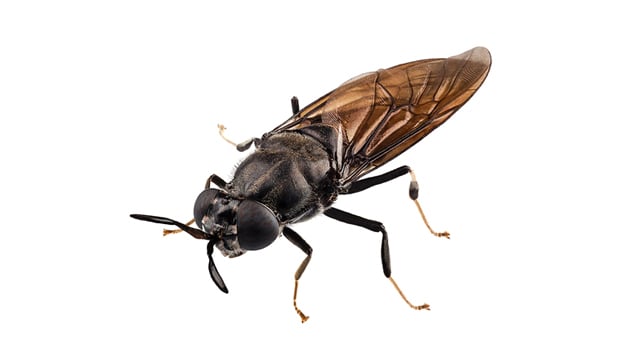Can insects solve the global protein gap?
Using insects as a protein source can potentially help feed the world, however primarily as livestock feed. Alfa Laval and Bühler Insect Technology Solutions (BITS) provide the production processes.
DATE 2024-07-25 AUTHOR Paul Connolly PHOTO Getty Images
The human population and meat consumption are growing at an unprecedented rate, while the available land for food production is shrinking. An estimated 85 percent of the Earth’s potential agricultural ground is already secured for food production, but by 2050 humans are expected to number more than 9 billion, requiring a 50 percent increase in the delivery of high-quality protein. It doesn’t take a mathematician to see those numbers don’t add up in favour of the human race.
The current arrangement is unsustainable. So, how do we feed the world in the years to come? One possible solution that is creating a buzz is insects.
Insect farming is a relatively new idea and until recently most efforts were experimental and small-scale. This changed in 2017, with the establishment of Bühler Insect Technology Solutions (BITS), a joint venture between food technology specialist, Bühler, and leading insect processor Protix.
Combining Protix’s expertise in insect rearing with Bühler’s experience in food and feed processing technology the goal is to develop insect rearing and feedstock processing on an industrial scale.
At the time Bühler was also looking for new partners to help scale up its operations, specifically through the provision of heat transfer and fluid separation technologies.
Alfa Laval’s role in the protein revolution
Alfa Laval had previously supplied Protix with processing technology and was also looking for ways to strengthen its offering in the growing market for insect processing.
According to BITS CEO Andreas Aepli, Alfa Laval is a clear leader in these technologies, but the decision to work together ultimately emerged from common understanding.
“I think we saw immediately from the first day of working with them that we had a similar mindset. Both of our companies focus on long-term quality leadership and enjoy a similar reputation in the market, but we don’t overlap on technology competence and thus complement each other’s strengths,” says Aepli.
Sumit Pingle, Alfa Laval’s Vice President Agro & Protein Systems, agrees.
The way we work and the way they work, we clicked very quickly: our team and their team, Andreas and myself. There was chemistry which made sense.”
A feed source for animals
It’s been clear to BITS from the start of their venture that the big wins for food security and the environment aren’t in changing what people eat; it’s in changing what animals eat – and that insects have a role to play.
“Some people are interested in insects as human food,” explains Aepli. “I think there is a business and that business will grow; however, the volumes are still too small to make a real impact on our food system.”
So, don’t expect any BITS-brand bug burgers on supermarket shelves anytime soon.
Rather, the primary focus is on producing animal feed derived from insect farming, which is much more sustainable and efficient. Generating one kilogramme of insect-based protein only requires two kilogrammes of feed, while proteins made from cattle require 20kg of feed for the same result.
And producing that kilogramme of insect-based protein requires a lot less space: only one square meter of nonfarming land. So rather than devoting large fields to growing soybeans for animal feed, all you need is an area smaller than a parking spot. Thus industrial scale insect production also has the potential to free up vast areas of land currently set aside to grow crops for animal feed.
What’s more, insects convert food waste into useable protein, creating a more sustainable food production cycle.
“Insects basically upcycle that food,” explains Aepli.
They extract and recombine the proteins from the food waste, and we reintroduce those proteins into the food life cycle as animal feed or fertilizer for crops.
Anderas Aepil, CEO at Bühler Insect Technology Solutions (BITS)
Quality and expertise
BITS’ move to industrial insect processing has come with challenges. Standardisation is critical to consistent quality. Safe and efficient insect farming requires careful climate control and biologically secure environments – not easy to achieve at scale.
And, as Aepli points out, the different areas of production require different skillsets.
“They can't usually be solved by a single partner or a single company by themselves. That’s one of the keys of the partnership between Bühler and Alfa Laval because Alfa Laval has experience in parts of the process where we are not the experts,” he explains.
“To have somebody who’s truly proficient in that area helps us to make the solution better.”
The combination appears to be working; the first customer plant has been successfully operating since June in the Netherlands, and several more are under way.
BITS have also been working with Pingle’s team at Alfa Laval on tailored solutions for their customers, with further plant projects currently being engineered.
The prospects look good for this dynamic and innovative collaboration. It represents a quantum leap in insect processing that will have dramatic implications for both food security and the planet.
Here - プロセスの未来を探求する物語
昆虫をハンバーガーにする革新的な食品加工技術や、再生可能エネルギーを貯蔵する新技術など、業界の新たな取り組みの数々が最新のHereに掲載されています。Hereがお伝えするのは、人と地球の両方に利益をもたらすソリューションを提供すべく、革新的なプロセスを探求する人々の物語です。Hereは、2019年にスウェーデン出版賞を受賞しました。
アルファ・ラバルのグローバルゴールへの貢献
国連は、世界のリーダー達が2030年までに達成するグローバルゴールとして、17の持続可能な開発目標(SDGs)を採択しました。そして今、我々のような企業もまたその達成を目指します。
Black soldier fly
Known for its fast growth cycle and high-capacity for breaking down organic matter, the larvae of the black soldier fly (pictured) is currently the insect of choice for BITS' insect protein processing efforts.

Bug Bites
Insects have long been considered delicacies in parts of Asia and Africa. In recent years a number of restaurants in Europe have begun serving plates of insects of diners.
あなたの好奇心をアルファ・ラバルで生かしてみませんか?
アルファ・ラバルは、困難な課題を解決するために、常に一歩先を行くことを目指しています。お客様、人々、そして地球のより良い未来のために、成功を加速させることが私たちのミッションであり、それを可能にするのは、何事にも好奇心を持って取り組む仲間です。好奇心は優れたアイデアを生み出す原動力であり、そこから生まれたアイデアは私たちの生活に進歩を促します。
アルファ・ラバルでは、好奇心を持つ人材が、仕事を通じて世界レベルの課題解決に向けてチャレンジする機会を大切にしています。是非採用情報をチェックしてみてください。
より良い進歩のために。アルファ・ラバルと共に。
アルファ・ラバル 年次・持続可能性報告書
私たちの最新の年次報告書では、昨年の出来事、ビジネスを牽引するトレンド、そして私たちがサービスを提供する業界について読むことができます。また、私たちの人々、製品、サービス、そして革新と持続可能性が私たちの全ての活動においていかに重要な役割を果たしているかについても、より理解を深めることができます。
持続可能性報告書は、年次報告書に統合されています。
